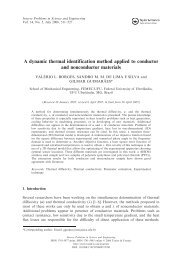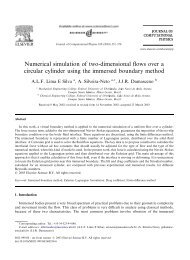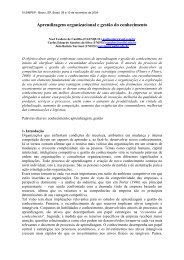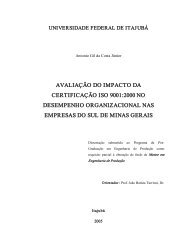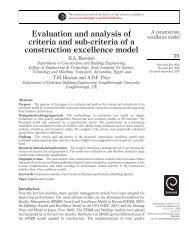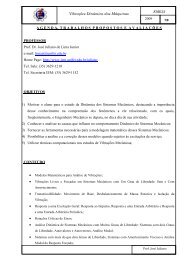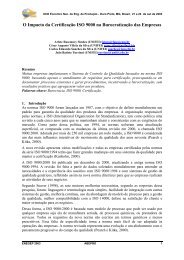Why Total Quality Management Programs Do Not Persist: The ... - IEM
Why Total Quality Management Programs Do Not Persist: The ... - IEM
Why Total Quality Management Programs Do Not Persist: The ... - IEM
You also want an ePaper? Increase the reach of your titles
YUMPU automatically turns print PDFs into web optimized ePapers that Google loves.
636 <strong>Why</strong> <strong>Total</strong> <strong>Quality</strong> <strong>Management</strong> <strong>Programs</strong> <strong>Do</strong> <strong>Not</strong> <strong>Persist</strong><br />
By committing themselves to hearing the unvarnished truth (valid data), talking<br />
about root causes of the problems identified and making their plans for change<br />
known to all in the organization, a senior team is signaling that TQM applies not<br />
only to “hard” technical processes but to “softer” processes such as leadership and<br />
teamwork. It increases the likelihood that the social system will adapt to the rigors<br />
the technical system imposes and vice versa (Trist, Higgins, Murray, & Pollock,<br />
1963). <strong>Management</strong> would be acting on the central tenet of TQM founders, namely,<br />
that continuous improvement in quality can only be achieved by focusing on and<br />
shaping the system.<br />
3. Insist that the data collection and discussion process allow important,<br />
often threatening, issues to get raised and “publicly” discussed. An inquiry<br />
into the effectiveness of the organization as a system will undoubtedly raise many<br />
difficult leadership, human, political, and cultural issues that may block TQM. Our<br />
research suggests that the six silent killers will certainly be put on the table if they<br />
are present because they represent core capabilities an effective task-driven organization<br />
must develop. <strong>The</strong> central problem for a senior team is to create a credible<br />
process, one that is visible to everyone in the organization and that employees will<br />
come to believe leads to an honest inquiry into gaps between management’s rhetoric<br />
and reality. Only by making “public” the nature of the dialogue process that will<br />
take place (everyone knows its specifications and understands how decisions will<br />
be made) can senior management make it clear that they care about continuous<br />
improvement in management quality, not just process and product improvement.<br />
This is essential for employees to sustain hope that management’s rhetoric will<br />
ultimately be translated into reality. Without that hope, commitment to learning<br />
and improvement needed for TQM erodes.<br />
For rich, potentially threatening, data to be reported by a task force charged<br />
with data collection, research suggests that the leader must ensure members’ psychological<br />
safety to speak the truth (Edmondson, 1999). Creating safety in dialogue<br />
about management and organizational problems will not only identify<br />
social system problems blocking TQM, it will reinforce the organization-wide<br />
climate essential for solving technical process problems in day-to-day operations.<br />
For example, psychological safety in medical surgery teams was associated with<br />
more open identification of technical problems and team learning (Edmondson,<br />
1999).<br />
We have found that one way to ensure safety for the data-gathering task force<br />
suggested in Principle 2 is to make its members reporters about what they learned<br />
in interviews as opposed to asking them to speak for themselves. Making their<br />
feedback a group report also provides them psychological safety. It is equally important<br />
that the process of dialogue be guided by ground rules that minimize the<br />
defensiveness of senior management and engage them in a productive conversation.<br />
Various social technologies and facilitating roles for consultants have been<br />
developed to do this (Beer, 1980; Schein, 1998). Of course, there is no substitute<br />
for the leader’s commitment to a dialogue process that balances advocacy and inquiry.<br />
That commitment is undoubtedly related to the leader’s willingness to be<br />
open to learning. <strong>The</strong> following quote by a general manager who led such a process<br />
captures the value of promoting a dialogue about unvarnished truth.



